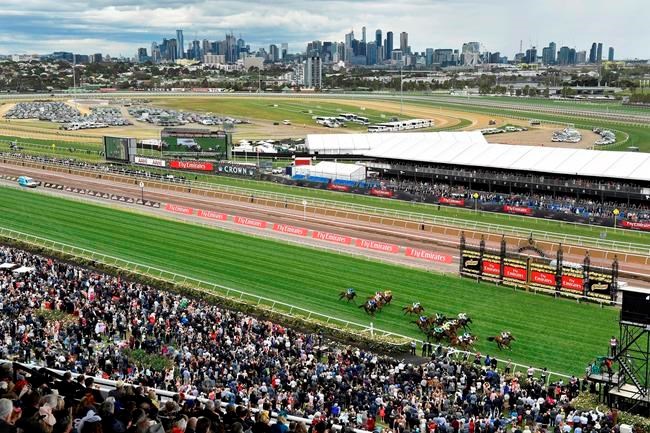SYDNEY, Australia — It's arguably more popular in Australia than any other country, so it's no surprise that horse racing is continuing — minus the spectators — despite the increasing travel and other restrictions amid the coronavirus pandemic.
The multi-billion dollar racing industry employs 250,000 part- and full-time workers in Australia, where there are more than 360 thoroughbred tracks. That's roughly one for every 68,000 people, a world-leading ratio by a considerable margin.
Australia boasts some of the world's richest races. The Melbourne Cup — “the race that stops a nation” — is one of the country's strongest cultural institutions. Sydney hosts The Everest, the $8.6 million sprint. It also has the most lucrative race for two-year-olds, the Golden Slipper, to be run this Saturday, in front of empty grandstands. Rosehill Racecourse would usually be crowded for this.
At least racing can exist without on-location spectators, with devotees able to watch and wager from home. And that's been the only option since measures were brought in last week limiting race days to participants only: jockeys, trainers, racetrack officials, media, and workers such as farriers and ambulance personnel.
The virus outbreak has coincided with some of the biggest events of the southern hemisphere autumn carnivals in Australia's two largest cities of Melbourne and Sydney. The Golden Slipper day, for instance, features five Group 1 (or Grade 1) races.
Aside from the removal of race day atmosphere, participants are having to become creative to do what they love in the time of coronavirus. Particularly some of those people who now need looking after the most if racing is to continue — the jockeys.
They are already being kept apart from other industry participants on course, but more and stricter measures are set to follow.
Melbourne will host a Group 1 sprint Friday night, the William Reid Stakes. Usually, some Sydney-based jockeys would fly to Melbourne for the night and return to Sydney the next morning for Golden Slipper day.
But racing officials have banned riders from shuttling between states on commercial flights for fear they will catch the virus.
So prominent jockey Hugh Bowman — the regular rider of the former top-ranked Winx — and a fellow Sydney jockey Tommy Berry, set out by car on Thursday for the 545-mile (
Completing the 10-hour drive to return for Sydney's big Saturday meeting would have been trickier. Luckily, a handful of prominent Melbourne-based jockeys — taking rides in Sydney — have chartered a private jet to dodge the commercial flight ban. Melbourne racing officials have helped by rescheduling the William Reid Stakes to run an hour earlier than planned, so the jockeys' flight can arrive at Sydney airport before its usual night-time curfew.
Racing officials “felt if we took those steps and followed the protocols ... we can keep our industry going,” the jockey organizing the charter flight, Craig Williams, told local media. “I'm happy to do what we're told so we can keep racing.”
Increased curbs on jockey movement are almost certain to be imposed.
Anthony Darmanin is in different predicament. He will ride Mystic Journey in the William Reid at 8:30 p.m, then head to Melbourne airport hoping to catch the last flight home to Tasmania state at 9:40 p.m. That's because Tasmania state has instituted restrictions starting midnight Friday forcing anyone entering the southern island state to self-quarantine for 14 days. The drive to the airport should take only 15 minutes, but with check-in time 30 minutes before departure, he'll be cutting it fine.
“It's going to be an intense hour but hopefully it all works out,” Darmanin told Racing.com.
Jockeys have also pushed for minimum weights in races to be raised immediately, so some of them will not have to “waste” — or lose weight quickly — as much as usual to make the handicap levels allocated to their horses. They're concerned their regular process of shedding weight by dieting or in saunas will at this time increase the chances of leaving their immune systems susceptible to the coronavirus.
Minimums have duly been raised 2.2 pounds (one kilogram) in New South Wales state, of which Sydney is the capital. Across the sea in New Zealand, where racing is also extremely popular, weights have been raised twice that much.
But, showing the challenges racing still faces amid COVID-19 — such as trying to ensure riders stay 1.5
Other measures to counter the coronavirus threat involve extra hygiene. On Golden Slipper day, jockeys will have to shower for five minutes on arrival and before departure, with their equipment disinfected between races.
Jockeys will have their temperatures checked on arrival at racecourses. This could be complicated by the regular practice of trying to lose weight late, with the heating up and the windows closed in the car. Accordingly, if a jockey's temperature is high, he or she will be checked again 15 minutes later before a decision is reached on their fitness for racing.
Leading Sydney jockey Nash Rawiller summed up the unusual impacts of the virus on the industry.
“It feels a bit different," he told the Sydney Morning Herald, "but if it is the way we keep going, we just have to do it.”
___
More AP sports: https://apnews.com/apf-sports and https://twitter.com/AP_Sports
The Associated Press




